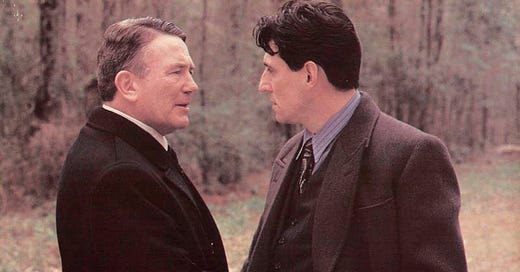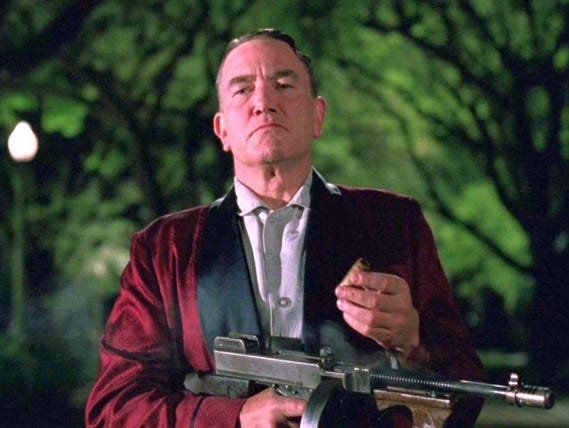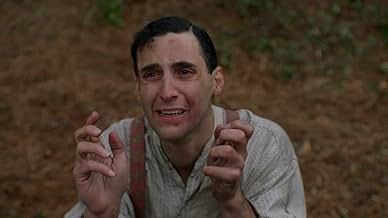Here’s a post based on this week’s episode of Fifteen-Minute Film Fanatics and a link to the ad-free version of the show. We choose the films almost at random: one of us will watch (or rewatch) something and text the other guy. We then record without any previous conversation, recreating the enthusiastic conversations people have in their cars on the way home from the theater. We also take requests, so leave a comment below if there’s a film you’d like us to cover. We’ve done over 275 and you can find them all here. You can subscribe to the show wherever you get your podcasts; please consider leaving a review on your platform of choice. Thanks.
Because I love it so much, this is a difficult film to describe; because its images and dialogue are ingrained in my mind, it’s an all-time favorite I no longer regularly watch. I went through a period during which I played the VHS on a loop, which is the right way to approach it, since the movie is about how a person navigates a world of information, some of which comes at him as asides or hints and some of which comes at him as loaded guns or punches in the nose. With a plot almost as complex as the novels of James Ellroy, Miller’s Crossing often feels, especially at first viewing, like a play by Samuel Beckett: the viewer is dropped into a world and expected to uncover its protocols. There’s nothing outside of the world of the movie to ground it in “reality” because the reality that interests the Coens is that of other movies.
That sounds a bit too highfalutin’. The idea is that Miller’s Crossing is a work of homage to the kinds of books and movies the Coen brothers enjoy. Many viewers will recognize Dashiell Hammett’s The Glass Key in the deep structure of the film, which isn’t an adaptation of Hammett’s novel but the Coens’ imitation of their artistic hero’s techniques. The slang, the corrupt City Hall, the warring gangs, the clothes, the smoking, the drinking, the forbidden female fruit—all of these are taken from the thousands of hours of movies and books that the Coens responded to with admiration and recreated with enthusiasm. The Coens operate this way in all their best work, which is often their attempt to make a film in genre they admire: Raising Arizona (1987) and The Hudsucker Proxy (1994) are their screwball comedies; True Grit (2010) and The Ballad of Buster Scruggs (2018) are their westerns; Blood Simple (1984) and Fargo (1996) are their true-crime stories. (That the events in Fargo are completely fictitious doesn’t remove it from that category: that opening “based on a true story” lie is meant to affect their viewers’ reactions. Quentin Tarantino works the same way, creating what he would love to pass for never-before-seen movies in genres he adores.
Because Miller’s Crossing is a “hyper version” of the gangster fiction, it’s also a paradoxically timeless period piece. Other directors of gangster films (Hawks, Coppola, DePalma) take great pains to convince us that we are in a specific time and place. Miller's Crossing assumes that the viewer will get the idea in a few seconds. It takes place in the Coens’ imagination of a gangster city, populated with the kinds of people that walked in and out of the movies they have watched their whole lives. They aren't concerned with historical accuracy as much as faithfulness to the genre. If Hammett’s shadow looms over this movie, it’s because the Coens wanted to make something that could pass for something he had written or at least would enjoy.
And yet, the Coens’ homage-based films never fall ino parody. You don’t mock the artists you love; you seek to be like them. Imitation has a bad reputation, but imitating the best is how people learn to make foul shots, wedding cakes, and movies. I once had a professor who made us select long sentences from what we read and imitate them, down to the exact parts of speech in the same order—and the imitations needed to move in the same rhetorical ways as the originals. This is easy with “See Spot run” but difficult when you’re using sentences from Mark Twain, Frederick Douglass, and Henry James. But if you try this (and I urge everyone to do so), you’ll end up admiring the originals even more. Anyone who would call Miller’s Crossing “derivative” or a “mere” imitation of gangster films should recall W. H. Auden’s dictum, “Some writers confuse authenticity, which they ought always to aim at, with originality, which they should never bother about.” Miller’s Crossing isn’t original in its form or content, but it is remarkably authentic in the way it examines the nature of the three ideas mentioned in the very first scene: friendship, character, and ethics.
Tom Reagan (Gabriel Byrne) moves through the film with at least one of these three subjects on his mind at any given time and is often juggling all three. Yet he does so privately; his values and assumptions are so secret that other characters, the viewer, and even, at times, Tom himself cannot fully articulate them. As he tells Verna (Marcia Gay Harden), “Nobody knows anybody. Not that well.” Sometimes, his actions are not the results of deep planning: like Sam Spade describes his method in The Maltese Falcon, Tom throws a monkey-wrench into situations to see what will happen. At first glance, his relationship with Leo (Albert Finney) is like that of Mr. Spock to Captain Kirk: he’s the brains, the one who urges his more emotional and childlike counterpart to think about what he’s doing. After Johnny Caspar leaves Leo’s office at the end of the opening scene, Tom tells Leo that he should reconsider his “bad play” of protecting Bernie Bernbaum (John Turturro):
TOM: Think about what protecting Bernie gets us. Think about what offending Caspar loses us.
LEO: Oh, come on, Tommy. You know I don't like to think.
TOM: Yeah. Well, think about whether you should start.
Tom is the wise counselor; he couldn’t do what Leo does and doesn’t want to try. He wants to live an untroubled life in which everyone acts according to the rules that have been established in thousands of pages and frames. The drama arises when Tom—who, despite being as cool as Gabriel Byrne—is only human, slips and makes a decision based purely on emotion when he allows Bernie to escape. His moment of humanity and inability to “put one in the brain” is, the the Coens’ gangster dream, one of illogical weakness. He looks in his heart, as Bernie begs him to do, but that look brings moral angina.
The surprise at the film’s end is not like that of Witness for the Prosecution or The Sting, in which the viewer finds he has been fooled by someone smarter and is grateful for the experience. These kinds of surprises come suddenly and spring upon a viewer like a tiger. The end of Miller’s Crossing is different. The surprise of the plot is that Tom has been acting with a vague agenda to set things right for Leo and trick the rival gangs into destroying each other; the deeper surprise is that Tom did all of this despite his decision to split from Leo forever. As we never know exactly when, in The Maltese Falcon, Spade figures out who killed Miles, we never know exactly when Tom hatched his plan to destroy Johnny Caspar. Tom probably couldn't tell us anyway. What’s more important than the timeline is Tom’s comeback when Verna tells him, “I thought you said you didn't care about Leo no more.” He responds, “I said we're through. That's not the same thing.” To Tom, friendship is a private religion; he would have understood what Christ meant when he told his disciples to pray in their closets. He is such a true a believer in the value of friendship that his loyalty to Leo transcends their relationship. He will never tell Leo what he did, because doing so would violate his assumptions about those same three words we hear at the beginning: friendship, character, and ethics. You don’t crow about having done your friend a favor, even if that favor costs the very friendship that motivated you to do the action in the first place.
All of this in a movie in which characters greet each other with, “What’s the rumpus?”








A film I deeply respect but didn't love. The perfect Gabriel Brynne vehicle. Most of the great gangster films tell you that they're about big ideas like ethics, loyalty, and honor and they signal whose side to be on. But I felt fairly confused and adrift in Miller's Crossing, where pretty much everyone is wrong. I was just saying I should give this a rewatch and see if I can appreciate it more, cuz it's been well over 10 years.
..somehow or other, I've heard of this movie but never seen it.
As I said in my Roger Ebert post last night: before seeing a movie, I don't read the reviews except to decide to see it. AFTER, then I read. So I'll be watching this one.